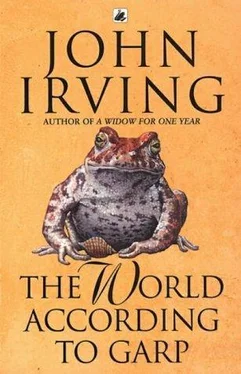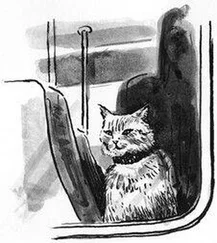Garp was now excited about the trip, and he was talking about other books he was going to write. ("A good sign,” John Wolf told Helen.)
Jenny and Roberta drove the Garps to Boston, where they took a plane to New York. “Don't worry about the airplane,” Jenny said. “It won't fall.”
“Jesus, Mom,” Garp said. “What do you know about airplanes? They fall all the time.”
“Keep your arms in constant motion, like wings,” Roberta told Duncan.
“Don't scare him, Roberta,” Helen said.
“I'm not scared,” Duncan said.
“If your father keeps talking , you can't fall,” Jenny said.
“If he keeps talking,” Helen said, “we'll never land .” They could see that Garp was all wound up.
“I'll fart all the way, if you don't leave me alone,” Garp said, “and we'll go in a great explosion.”
“You better write often,” Jenny said.
Remembering dear old Tinch, and his last trip to Europe, Garp told his mother, “This time I'm just going to ab-ab-absorb a lot, Mom. I'm not going to write a w-w-word.” They both laughed at this, and Jenny Fields even cried a little, although only Garp noticed; he kissed his mother good-bye. Roberta, whose sex reassignment had made her a dynamite kisser, kissed everyone several times.
“Jesus, Roberta,” Garp said.
“I'll look after the old girl while you're gone,” Roberta said, her giant arm dwarfing Jenny, who looked so small and suddenly very gray beside her.
“I don't need any looking after,” Jenny Fields said.
“It's Mom who looks after everyone else,” Garp said.
Helen hugged Jenny, because she knew how true that was. From the airplane, Garp and Duncan could see Jenny and Roberta waving from the observation deck. There had been some seat changes because Duncan had wanted a window seat on the left-hand side of the plane. “The right-hand side is just as nice,” a stewardess said.
“Not if you don't have a right eye,” Duncan told her, pleasantly, and Garp admired how the boy was feeling so bold about himself.
Helen and the baby sat across the aisle from them. “Can you see Grandma?” Helen asked Duncan.
“Yes,” Duncan said.
Although the observation deck was suddenly overrun with people wanting to see the takeoff, Jenny Fields—as always—stood out in her white uniform, even though she was short. “Why does Nana look so tall?” Duncan asked Garp, and it was true: Jenny Fields towered head and shoulders above the crowd. Garp, realized that Roberta was lifting his mother up as if his mother were a child. “Oh, Roberta's got her!” Duncan cried. Garp looked at his mother hefted up in the air to wave goodbye to him, safe in the arms of the old tight end; Jenny's shy, confident smile touched him, and he waved out the window to her, although Garp knew that Jenny couldn't see inside the plane. For the first time, his mother looked old to him; he looked away—across the aisle, at Helen with their new child.
“Here we go,” Helen said. Helen and Garp held hands across the aisle when the plane lifted off, because, Garp knew, Helen was terrified of flying.
In New York, John Wolf put them up in his apartment; he gave Garp and Helen and baby Jenny his own bedroom and graciously offered to share the guest room with Duncan.
The grownups had a late dinner and too much cognac. Garp told John Wolf about the next three novels he was going to write.
“The first one is called My Father's Illusions ,” Garp said. “It's about an idealistic father who has many children. He keeps establishing little utopias for his kids to grow up in, and after his kids grow up he becomes a founder of small colleges. But all of them go broke—the colleges and the kids. The father keeps trying to give a speech at the U.N., but they keep throwing him out; it's the same speech—he keeps revising and revising it. Then he tries to run a free hospital; it's a disaster. Then he tries to institute a nationwide free-transportation system. Meanwhile, his wife divorces him and his children keep growing older, and turning out unhappy, or fucked-up—or just perfectly normal, you know. The only thing the children have in common are these dreadful memories of the utopias their father tried to have them grow up in. Finally, the father becomes the governor of Vermont.”
“Vermont?” John Wolf asked.
“Yes, Vermont,” Garp said. “He becomes governor of Vermont, but he really thinks of himself as a king. More utopias, you see.”
“ The King of Vermont! ” John Wolf said. “That's a better title.”
“No, no,” Garp said. “That's another book. No relation. The second book, after My Father's Illusions , will be called The Death of Vermont .”
“Same cast of characters?” Helen asked.
“No, no,” Garp said. “Another story. It's about the death of Vermont.”
“Well, I like something that is what it says it is,” John Wolf said. “One year spring doesn't come,” Garp said.
“Spring never does come to Vermont, anyway,” Helen said.
“No, no,” Garp said, frowning. “This year summer doesn't come, either. Winter never stops. It warms up one day and all the buds appear. Maybe in May. One day in May there are buds on the trees, the next day there are leaves, and the next day the leaves have all turned. It's fall already. The leaves fall off the trees.”
“A short foliage season,” Helen said.
“Very funny,” Garp said. “But that's what happens. It's winter again; it will be winter forever.”
“The people die?” John Wolf asked.
“I'm not sure about the people,” Garp said. “Some leave Vermont, of course.”
“Not a bad idea,” Helen said.
“Some stay, some die. Maybe they all die,” Garp said.
“What's it mean?” John Wolf asked.
“I'll know when I get there,” Garp said. Helen laughed.
“And there's a third novel, after that?” John Wolf asked.
“It's called The Plot against the Giant ,” Garp said.
“That's a poem by Wallace Stevens,” Helen said.
“Yes, of course,” Garp said, and he recited the poem for them.
The Plot against the Giant
First Girl
When this yokel comes maundering,
Whetting his hacker,
I shall run before him,
Difusing the civilest odors
Out of geraniums and unsmelled flowers.
It will check him.
Second Girl
I shall run before him,
Arching cloths besprinkled with colors
As small as fish-eggs.
The threads
Will abash him.
Third Girl
Oh, la... le pauvre!
I shall run before him,
With a curious puffing.
He will bend his ear then.
I shall whisper
Heavenly labials in a world of gutturals.
It will undo him.
“What a nice poem,” Helen said.
“The novel is in three parts,” Garp said.
“Girl One, Girl Two, Girl Three?” John Wolf asked.
“And is the giant undone?” Helen asked.
“Is he ever,” Garp said.
“Is he a real giant, in the novel?” John Wolf asked.
“I don't know, yet,” Garp said.
“Is he you ?” Helen asked.
“I hope not,” Garp said.
“I hope not, too,” said Helen.
“Write that one first,” John Wolf said.
“No, write it last,” Helen said.
“ The Death of Vermont seems the logical one to write last,” John Wolf said.
“No, I see The Plot against the Giant as last,” Garp said.
“Wait and write it after I'm dead,” Helen said.
Everyone laughed.
“But there are only three,” John Wolf said. “What then? What happens after the three?”
“I die,” Garp said. “That will make six novels altogether, and that's enough.”
Читать дальше












